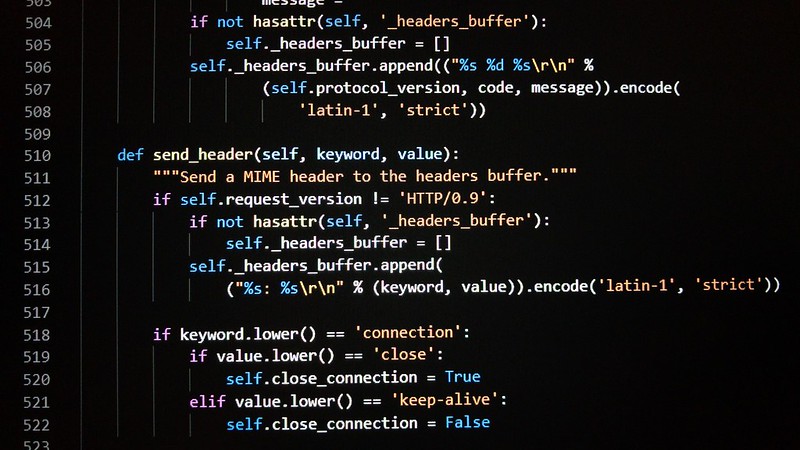
When you’re learning Python, you’re bound to run into errors. These come in two main types: syntax errors and exceptions.
Syntax Errors
Syntax errors, or parsing errors, happen when Python can’t understand your code. For example:
while True print('Hello world')
You’ll see something like this:
File "<stdin>", line 1
while True print('Hello world')
^^^^^
SyntaxError: invalid syntax
Here, Python highlights the spot where it got confused. It’s not always the actual mistake, but it helps narrow things down. In this case, the issue is a missing colon (:) after while True.
Exceptions
Even if your code is syntactically correct, it might still crash when something goes wrong during execution. These runtime errors are called exceptions.
Examples:
10 * (1 / 0)
# ZeroDivisionError: division by zero
4 + spam * 3
# NameError: name 'spam' is not defined
'2' + 2
# TypeError: can only concatenate str (not "int") to str
Each exception type describes what went wrong: dividing by zero, using an undefined name, or trying to mix strings and integers.
Handling Exceptions
You can write code to catch and handle exceptions gracefully using try and except. Here’s a basic example:
while True:
try:
number = int(input("Enter a number: "))
break
except ValueError:
print("Oops! That wasn't a valid number. Try again...")
How this works:
- The code inside
tryruns. - If it runs fine,
exceptis skipped. - If an error occurs, Python jumps to the matching
exceptblock. - If no matching
exceptis found, the program crashes.
You can have multiple except blocks:
try:
# some risky code
except FileNotFoundError:
print("File not found!")
except ValueError:
print("Invalid value!")
except Exception as e:
print(f"Unexpected error: {e}")
raise
You can also catch multiple exceptions in a single block:
try:
# code
except (TypeError, NameError):
print("A type or name error occurred.")
Custom Exception Classes
You can define your own exception classes:
class MyError(Exception):
pass
raise MyError("Something went wrong!")
Exceptions can carry extra data, too:
try:
raise Exception("spam", "eggs")
except Exception as e:
print(type(e)) # <class 'Exception'>
print(e.args) # ('spam', 'eggs')
print(e) # ('spam', 'eggs')
x, y = e.args
print("x =", x)
print("y =", y)
Using else with try/except
You can run code if no exception occurs using else:
for arg in sys.argv[1:]:
try:
f = open(arg, 'r')
except OSError:
print("Cannot open file:", arg)
else:
print(arg, "has", len(f.readlines()), "lines")
f.close()
finally: Cleanup No Matter What
The finally block is used for cleanup actions that must happen no matter what:
try:
raise KeyboardInterrupt
finally:
print("Goodbye, world!")
Even if an error happens or the user interrupts, the finally block runs.
More realistic example:
def divide(x, y):
try:
result = x / y
except ZeroDivisionError:
print("division by zero!")
else:
print("result is", result)
finally:
print("executing finally clause")
This will always print the finally message, whether an error occurs or not.
Using with for Automatic Cleanup
Instead of manually opening and closing files:
with open("myfile.txt") as f:
for line in f:
print(line, end="")
This way, the file is automatically closed, even if an error happens.
Raising Exceptions
You can raise exceptions yourself:
raise ValueError("Invalid input!")
To re-raise an exception after catching it:
try:
raise NameError("HiThere")
except NameError:
print("An exception flew by!")
raise
Exception Chaining
If one error leads to another, you can chain them:
try:
open("missing_file.txt")
except OSError as e:
raise RuntimeError("Unable to handle error") from e
To suppress the original exception info:
try:
open("missing_file.txt")
except OSError:
raise RuntimeError from None
Multiple Unrelated Exceptions (Python 3.11+)
If you want to raise multiple unrelated exceptions at once:
def f():
excs = [OSError("error 1"), SystemError("error 2")]
raise ExceptionGroup("Multiple errors occurred", excs)
You can handle specific ones using except*:
try:
f()
except* OSError:
print("There were OSErrors")
except* SystemError:
print("There were SystemErrors")
This is useful for async code, tests, or batch processing where multiple things can fail independently.









